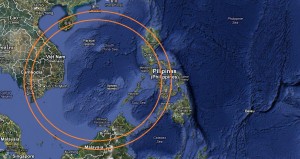MANILA, Philippines – The Department of Foreign Affairs (DFA) said Thursday that the formal naming of the West Philippine Sea from the South China Sea affirmed the country’s “sovereign rights” over its territories, saying it showed that the country had the power to designate names over areas which we consider as “indisputably ours.”
“The naming of the West Philippine Sea is actually an exercise of sovereign jurisdiction which allows us the inherent power and right to designate names over the maritime areas that we consider indisputably ours,” Raul Hernandez, DFA spokesman, said in an interview with reporters.
President Benigno Aquino III on September 5 signed an order renaming South China Sea waters within the country’s exclusive economic zone (EEZ) West Philippine Sea.
The order said that these areas included the Luzon Sea as well as the waters around, within and adjacent to the Kalayaan Island Group and Bajo de Masinloc, also known as Scarborough Shoal.
Hernandez said that the DFA would be submitting, at an appropriate time, a copy of the Administrative Order (AO), together with official maps showing the West Philippine Sea, to the United Nations to “inform them and have the West Philippine Sea included in international maps.”
AO 29 orders the National Mapping and Resource Information Authority (NAMRIA) to “produce and publish charts and maps of the Philippines reflecting the West Philippine Sea.”
“When the charts and the maps are ready and all documentations have been done, we will submit this to the UN and other relevant international organizations to inform them, the idea is to inform them and have the West Philippine Sea included in the international maps,” Hernandez said.
“When we deposit the copy of the AO together with the official map of the Philippines, we expect them to include it in the international maps that will be issued by relevant international organizations,” he added.
Asked whether this action would provoke tension, Hernandez said that he saw no conflict as the Philippines was only “focused on what is ours.”
Hernandez clarified that the Philippines, unlike China, only claimed portions of the area as identified by the baselines law.
He said that he had not hear of any protests to the Philippine action of renaming the area.
However, Taiwan’s Central News Agency had reported that Taiwan’s Ministry of Foreign Affairs issued a statement late Wednesday saying it did not recognize the move by the Philippines.
The report quoted the ministry as saying that ”whether from the perspective of history, geography or international law, the Spratly Islands, the Paracel Islands, the Macclesfield Bank and the Pratas Islands as well as their surrounding waters, sea beds and subsoil, are all inherent parts of the territory of the Republic of China.”
Asked about this, Hernandez said that he had not received reports but that the country did not maintain diplomatic relations with Taiwan because of the One China Policy which says that diplomatic ties were maintained with Beijing while only economic ties were kept with Taipei.
China, Philippines, Brunei, Malaysia, Vietnam, and Taiwan claim all or parts of the West Philippine Sea.
Asked whether the move to rename strengthens our claim to the areas, Hernandez said that the basis of our claims in the areas was effective occupation and jurisdiction based on public international law and as provided for by the United Nations Convention on the Law Of the Sea (UNCLOS).
“This just affirms what is actually already declared as ours,” Hernandez said.
